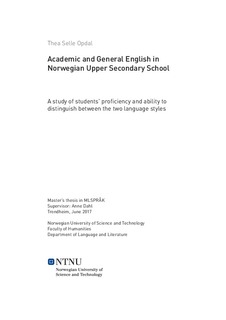| dc.description.abstract | Norway is one of the countries with the highest English language proficiency in the world (Bonnet, 2004; MCG, 2009; EF EPI, 2016). Yet, research shows that Norwegian students entering or studying in university or college find the (academic) English language they encounter in higher education challenging (Hellekjær, 2005; 2010; 2012). It has also been found that Norwegian university students are more likely to perform like native speakers in terms of general English than in terms of academic English (Busby, 2015). The current study aims to investigate Norwegian upper secondary school students' proficiency in academic and general English language and their ability to distinguish between the two language styles. The study was carried out by testing final year students in ordinary upper secondary schools and in IB programmes using a test battery specifically designed for this study, and comparing their scores. Results indicated that student in IB programmes have a higher level of academic English language proficiency than students in ordinary upper secondary schools, and that they also have better ability to distinguish between academic and non-academic language styles. Furthermore, results indicate that there is a clearer difference between students in ordinary Norwegian upper secondary schools and students in IB programmes in terms of academic English proficiency than in terms of general English proficiency. | nb_NO |
